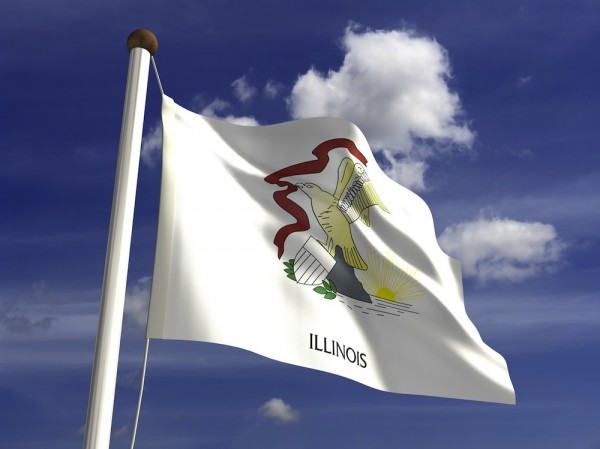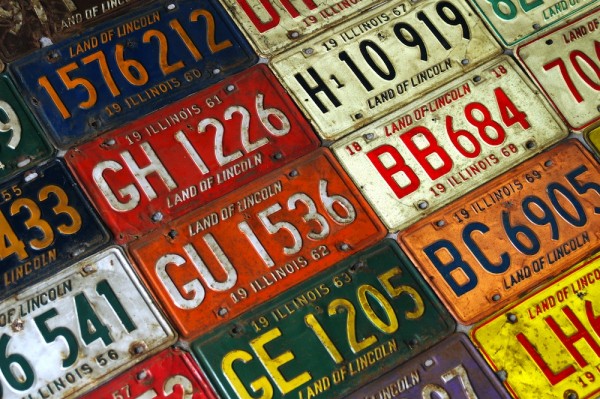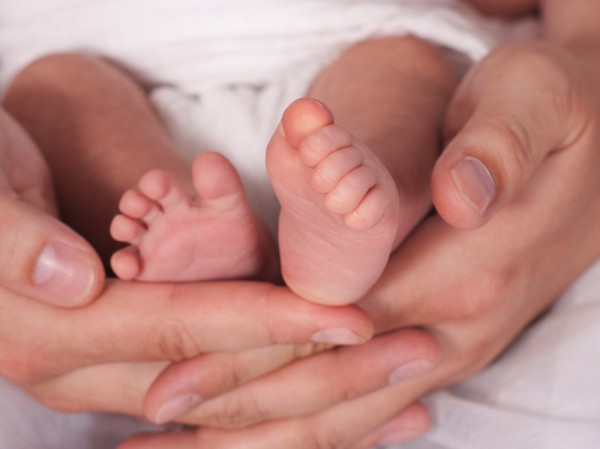Illinois Adoption Guide
Welcome, Illinoisans! This Illinois adoption guide was written to provide you with a single spot to find information about adoption within Illinois. It will walk you through everything from laws in Illinois that will impact your adoption to reviews of adoption service providers in Illinois.
This guide is divided into five parts: general information about adoption in Michigan, then sections dedicated to domestic infant adoption (starting in Slide 6), foster adoption (starting in slide 20), international adoption (starting in slide 30), and stepparent adoption (starting in slide 34). And don’t miss our slide filled with links to helpful adoption resources (slide 37).
Are you interested in growing your family through domestic infant adoption? Click here to connect with an adoption professional who can answer your questions.

1. Please Note:
Although care has been taken to ensure the accuracy, completeness, and reliability of the information provided in this slideshow guide, you should not rely on it to make decisions.
Instead, you should rely on licensed professionals in making decisions relative to adoption.
The information in this guide is subject to change without notice. Adoption.com is not responsible for the consequences of relying on this information.
In no event shall Adoption.com be liable for any direct, indirect, special, or incidental damage resulting from, arising out of, or in connection with the use of this information.

2. Did You Know?
Fun fact about families in this state: Illinois boasts the highest number of personalized license plates, more than any other state.

3. Adoption in Illinois at a Glance
-Kids in foster care available for adoption in 2012: 19,400
-Foster adoptions completed in 2012: 1,472
-International adoptions complete in 2012: 56
-Other adoptions completed in 2012: 1,841

4. Can I Adopt in Illinois?
Adoption requirements in the state of Illinois are as follows:
Age: You must be at least 21 years old.
Marital Status: You may be single, married, or in a civil union. If you are separated, you must have lived apart from your spouse for at least 12 months.
Finances: You must be able to support your own family.
Housing: You may rent or own your home, but you will need enough space for a child
Work: You can work in or out of your home, or be retired
Personality: Must be flexible, energetic, patient, willing to work with social workers and other support people, and willing to provide a loving and supportive environment.
Experience: No parenting experience is required to adopt.
All requirements within the state of Illinois are governed by the Department of Children & Family Services through the child welfare system. Certain agencies may differ in protocol. Illinois offers the PRIDE program, which helps potential adoptive parents become licensed. This program runs for a total of 27 hours over 9 weeks, and teaches parents how to care for an adopted child.
DISQUALIFYING CRIMES: In this state, you may not adopt if you have been convicted of any of the following: child abuse or neglect, spousal abuse, a crime against children, or a crime involving violence.
SOURCE: Childwelfare.gov
Illinois.gov

5. Developing a Support System
It’s essential to have a good network of family, friends, and neighbors to support you through your adoption process.
It’s also important to connect with other adoptive parents. You can begin making these connections in our adoption forums.
You may also want to consider joining a support group for adoptive parents.

6. Domestic Infant Adoption in Illinois
Before you get started, click here to learn more about the overall process of adopting an infant in the United States.
Then, because laws and processes vary from state to state, come back to get the details about adoption in Illinois.

7. Get Professional Help
In Illinois you can complete your adoption through an adoption agency or an adoption attorney. Make sure that your adoption attorney is reputable and licensed in the state of Illinois.
Some people pursuing a private adoption find it beneficial to work with a professional adoption facilitator, an individual or organization that matches birth parents with adoptive parents in exchange for a fee.
It is illegal in Illinois for any individual or organization, other than a child welfare agency, to accept payment for providing adoption services. However, any individual wishing to adopt may advertise on their own behalf.
You can browse and read reviews about adoption service providers in Illinois here.
For more information about picking an adoption agency, learn about the Top Fifteen Things to Look for In An Adoption Agency.

9. Domestic Infant Adoption: Complete a Home Study
Regardless of the type of adoption you choose, you will need to complete an adoption home study.
Your home study social worker will help educate you about adoption and ensure that you (and your partner, if applicable) meet the requirements outlined on Slide Four.
Click here to learn more about the Home Study process.

10. Domestic Infant Adoption: Spread the Word
Illinois adoption law permits prospective adoptive parents, as well as birth parents, to publish advertisements on their own behalf regarding their desire to adopt.
Licensed agencies and lawyers may also advertise adoption-related services. It is illegal for any other entity to publish advertisements for adoption-related services.
One of the most important things you can do while waiting for an adoption match is to let everyone know about your hope to adopt. Many adoption connections are made through word-of-mouth referrals.

11. Domestic Infant Adoption: Parent Profiles
If advertising is allowed in your state, creating a profile on Adoption.com Parent Profiles allows you to easily share your story with those considering placing their child for adoption.
Features like videos and photos, posts, Pinterest-like favorites, and recommendations and endorsements make it easy to create a profile as unique as you are, increasing the likelihood that you will stand out and connect with that right person.
Rich communication options like video chat and instant messaging make connecting easy. A mobile-responsive design means that you will never be out of reach.
What’s more, Adoption.com receives over 650,000 monthly visits, which means your profile will receive unparalleled exposure. You can even view and monitor your progress through a detailed statistics page.
Ready to get started? Visit adoption.com/profiles to create your profile.

12. Domestic Infant Adoption: Relinquishment
In Illinois, consent to adopt and relinquishment of parental rights must take place in court, unless court appearance is waived for special circumstances such as military service.
Birth mother’s consent shall not be taken less than 72 hours after the birth of a child. The birth father may sign any time before or after the birth of the child.
Relinquishment of parental rights is irrevocable unless obtained by fraud or duress. No action to revoke relinquishment may be taken after 12 months from the date of consent, even in cases of fraud or duress.

13. Domestic Infant Adoption: Birth Father Rights
In Illinois, consent from the birth father is required if he is married to the birth mother, or if effort to establish paternity is being made or has been determined.
If effort to establish paternity has not been made by an unmarried birth father within 30 days of birth, the state considers that to be a relinquishment of parental rights on his part.
A birth father may consent to adoption at any time before or after birth. If the father consents to an adoption before the birth of the child, that consent can be revoked within 72 hours of the birth.

14. Domestic Infant Adoption: Laws about Birth Parent Expenses
Hopeful adoptive parents and/or an adoption agency may provide legal and living expenses for an expectant mother. There are, however, requirements governing such support.
Prospective adoptive parents may pay for the “reasonable living expenses” for the birth parents before and after the birth of the child they are seeking to adopt. This means that there is no set dollar amount an expectant mother can receive, unlike in other states.
However, every donation needs to be approved; licensed agencies may approve spending, but private adoptions need approval from the court. These expenses include basic needs such as housing, food, and clothing.
Reasonable expenses do not include lost wages, gifts, or educational costs. Payment for expenses is limited to no more than 120 days prior to birth and 60 days after.
For more information about birth parent expenses click here.

15. Domestic Infant Adoption: Post-Adoption Contact Agreements
Post-adoption contact agreements are not addressed in Illinois adoption law, and are therefore not enforceable by the court.

16. Domestic Infant Adoption: Finalization
In Illinois, a child must be in an adoptive home for six months before the adoption can be finalized. The time varies beyond six months depending upon the adoption agency. The prospective adoptive family must petition the court for an adoption of the child within 30 days after the consent for adoption has been signed by the birth parents.

17. Domestic Infant Adoption: Adopting in Illinois from Out of State
With private (usually domestic infant) adoptions, it is always possible to adopt a child within Illinois, even if you live in a different state.
The Interstate Compact for the Placement of Children (ICPC) was adopted in the 1960s to provide for oversight and protection of children placed for foster care or adoption between states.
If you are adopting a child from another state, you will need to receive permission from the ICPC office in the state where the child is from.
Your agency or attorney will send the office copies of your home study and some other paperwork. They will need to approve your packet before you can bring your child home.
Read more about the ICPC here.

18. Domestic Infant Adoption: Traveling to Illinois from Out of State
Hotel costs vary based on what part of Illinois you are in, but generally average around $125 per night.
Hotels closer to Chicago may be higher, while in southern Illinois the average nightly cost may be lower.
There are many sights to see when visiting Illinois, especially in Chicago, including the Magnificent Mile, Willis Tower, and many interesting neighborhoods, parks, and theaters.

19. Foster Adoption in Illinois
Before you get started, click here to familiarize yourself with the overall process of adopting children through foster care.
Then, because laws and processes vary from state to state, come back here to get the details about foster adoption in Illinois.

20. Foster Adoption: Children Available for Foster Adoption in Illinois
There are 17,920 children in foster care in Illinois; 2,719 of these children are waiting for adoptive families.
You can find a photolisting of waiting children
Here

21. Foster Adoption: Get Professional Help
In Illinois, foster care adoptions are completed through licensed agencies, or through the Illinois Department of Child and Family Services.
To find adoption agencies in Illinois and to read reviews, check out Adoption.com’s Reviews page for Illinois.
You will still need to complete a home study as part of this process. Most licensed agencies cover the cost of a foster care adoption home study.

22. Becoming Part of the Foster Care System
In the state of Illinois, the goal of most cases in foster care is for the children to be returned home. In the event that reunification is unlikely, the agency or DCFS will begin a concurrent plan for the child.
This means the goal of reunification will remain, but an alternative plan for permanency will be created. This alternative plan often is adoption or guardianship, and a home is found that would be willing to provide that permanency.
These placements are known as “legal risk” cases, since the children may be returned home to their birth families, but also may become available for adoption.

23. Post Adoption Contact Agreements
Post-Adoption contact agreements are not addressed in Illinois adoption law, and therefore are not enforceable by a court. In many foster adoptions where abuse or neglect have been an issue, post-adoption contact agreements are not recommended.
A post-adoption contact agreement is a voluntary agreement that can be entered into by adoptive and birth families. The agreement outlines details about how much contact the birth and adoptive families will have after the adoption is finalized.
In instances in which the child’s biological parents’ rights have been involuntarily terminated, the well-being of the child needs to be first and foremost in everyone’s minds if a post-adoption contact agreement is created.
Caseworkers and therapists should be consulted in making decisions about contact after adoption.

24. Finalization
In Illinois, the adoption process can begin once the termination or surrender of parental rights has taken place. After termination, the adoptive family must sign a petition to adopt the child.
If the birth parents have surrendered their rights, the petition to adopt must be signed within one year of the surrender. The child must live in the adoptive home for six months before finalization can take place.
Agencies will assist with this paperwork, and an adoption lawyer will also be helpful in reviewing the adoption subsidy paperwork.

25. Adoption Assistance
Various types of adoption assistance may be available through the state of Illinois when adopting through the foster care system.
These include reimbursement for non-recurring adoption expenses, Medicaid services, necessary counseling services, day care, or monthly payments matching the foster care payment prior to adoption.
Eligibility for these types of assistance is based on several factors including special needs, age, and history of trauma.

26. Foster Adoption: Adopting in Illinois from Out of State
The Interstate Compact for the Placement of Children (ICPC) was adopted in the 1960s to provide for oversight and protection of children placed for foster care or adoption between states.
If you are adopting a child from another state, you will need to receive permission from the ICPC office in the state where the child is from. Your agency or attorney will send the office copies of your home study and some other paperwork. They will need to approve your packet before you can bring your child home.
Read more about the ICPC here.

27. Foster Adoption: Traveling to Illinois from Out of State
Hotel costs vary based on what part of Illinois you are in, but generally average around $125 per night. Hotels closer to Chicago may be higher, while in southern Illinois the average nightly cost may be lower.
There are many sights to see when visiting Illinois, especially in Chicago, including the Magnificent Mile, Willis Tower, and many interesting neighborhoods, parks, and theaters.
If your interested in the outdoors, be sure to check out Starved Rock State Park.

28. International Adoption in Illinois
Before you get started, click here to familiarize yourself with the overall process of international adoption.
Then, because laws and processes vary from state to state, come back here to get the details about international adoption in Illinois.

29. International Adoption: Photolisting
There are millions of beautiful children across the world who are hoping to find a forever family.
Click here to meet some of them through our Photolisting.

30. International Adoption: Get Professional Help
With international adoptions, your only choice is to complete your adoption through an agency.
Because of the Universal Accreditation Act, all adoption agencies completing international adoptions are required to be credentialed according to federal standards. Make sure to check with any agency before working with them to ensure they have this accreditation in place!
In selecting an international adoption agency, there are Four Essential Criteria you should probably consider.
Click here to browse through reviews of adoption agencies in Illinois.
In order to be approved to adopt internationally, you will need to complete an international adoption-specific home study.

31. International Adoption: Post-Adoption Requirements
In order to finalize the adoption, you will need to complete all paperwork and contact your state agency.
You will also need to request a U.S. birth certificate for your child.
Read more about post-adoption requirements here.

32. Stepparent Adoption in Illinois
Before you get started, click here to familiarize yourself with the overall process of stepparent adoption.
Then, because laws and processes vary from state to state, come back here to get the details about stepparent adoption in Illinois.

33. Stepparent Adoption: Terminating Parental Rights
In order for you to adopt the child of your spouse, the corresponding biological parent’s rights will first need to be terminated, either voluntarily or involuntarily.
You will need to consult with an adoption attorney about your desire to adopt. He/she can help you decide if it’s likely that the biological parent would be willing to relinquish rights OR if it would be feasible to pursue involuntary termination of his/her parental rights.

34. Stepparent Adoption: Petitioning to Adopt
Once parental rights have been terminated, you can file a petition to adopt with the courts.
You and your spouse will both testify in court regarding the stability of your marital relationship, the bond you’ve developed with your stepchild, and your desire to become the legal parent of your stepchild.
You will generally not be required to complete a background check or home study as part of the stepparent adoption process.

35. Adoption Resources
Adoption Forums
Wiki Laws for Illinois
Illinois Parent Profiles
Adoption Stories

36. Works Cited







